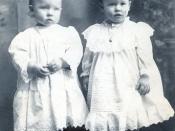INTRODUCTIONThis research paper provides the helping professional with an overview of treatment issues referred to as spiritual by those recovering from alcohol and drug addictions through 12-step programs like that of Alcoholics Anonymous. The goal of this research paper is to discuss these spiritual constructs in terms of cognitive-behavioral psychology, a knowledge base common to most professionally trained helpers.
In 1975, Burt called for Alcoholics Anonymous (AA) and behavioral psychology to benefit from one another through "cooperation, consideration and shared knowledge" (p. 58). More recently, Skinner (1987) proposed a humanistic alternative to AA's 12 steps to be palatable to nonreligious AA members and to be helpful for counselors. Beckman (1980) applied an attributional analysis to explain AA's apparent success and appeal to alcoholics, and Brown, Peterson, and Cunningham (1988) applied a cognitive-behavioral approach to spirituality for recovering alcoholics and addicts. Behind these attempts was a desire to bridge the gulf between professionals (counselors, psychologists, researchers) and participants and paraprofessionals in the largest self-help movement in this country.
With the same purpose in mind, this research paper reviews spiritual treatment concepts common to self-help addiction recovery programs, or 12-step programs, and proposes that these concepts are not foreign to psychological understandings of addiction treatment issues, particularly cognitive-behavioral approaches. Furthermore, many of these concepts are supported by the literature on counseling relationship variables, although a discussion of these is not the focus of this research paper.
Ninety-five percent of inpatient addiction treatment programs in the United States incorporate AA and Narcotics Anonymous (NA) at some level (Brown et al., 1988). In her research with AA participants, Brown (1985) found that 77% had experienced some form of psychotherapy before abstinence and 45% after abstinence. In another survey of AA members, Maxwell (1976) reported that 31.5% seek additional professional help after...



Good work Dude !!
Although your essay is in pending state but really helped me a lot in order to finalize my assignment. Thanks for uploading such a nice essay!
1 out of 1 people found this comment useful.